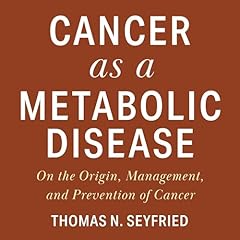
Ravenous
Otto Warburg, the Nazis, and the Search for the Cancer-Diet Connection
No se pudo agregar al carrito
Add to Cart failed.
Error al Agregar a Lista de Deseos.
Error al eliminar de la lista de deseos.
Error al añadir a tu biblioteca
Error al seguir el podcast
Error al dejar de seguir el podcast
 Exclusivo para miembros Prime: ¿Nuevo en Audible? Obtén 2 audiolibros gratis con tu prueba.
Exclusivo para miembros Prime: ¿Nuevo en Audible? Obtén 2 audiolibros gratis con tu prueba.Compra ahora por $20.25
-
Narrado por:
-
Mark Bramhall
-
De:
-
Sam Apple
The Nobel laureate Otto Warburg—a cousin of the famous finance Warburgs—was widely regarded in his day as one of the most important biochemists of the twentieth century, a man whose research was integral to humanity’s understanding of cancer. He was also among the most despised figures in Nazi Germany. As a Jewish homosexual living openly with his male partner, Warburg represented all that the Third Reich abhorred. Yet Hitler and his top advisors dreaded cancer, and protected Warburg in the hope that he could cure it.
In Ravenous, Sam Apple reclaims Otto Warburg as a forgotten, morally compromised genius who pursued cancer single-mindedly even as Europe disintegrated around him. While the vast majority of Jewish scientists fled Germany in the anxious years leading up to World War II, Warburg remained in Berlin, working under the watchful eye of the dictatorship. With the Nazis goose-stepping their way across Europe, systematically rounding up and murdering millions of Jews, Warburg awoke each morning in an elegant, antiques-filled home and rode horses with his partner, Jacob Heiss, before delving into his research at the Kaiser Wilhelm Society.
Hitler and other Nazi leaders, Apple shows, were deeply troubled by skyrocketing cancer rates across the Western world, viewing cancer as an existential threat akin to Judaism or homosexuality. Ironically, they viewed Warburg as Germany’s best chance of survival. Setting Warburg’s work against an absorbing history of cancer science, Apple follows him as he arrives at his central belief that cancer is a problem of metabolism. Though Warburg’s metabolic approach to cancer was considered groundbreaking, his work was soon eclipsed in the early postwar era, after the discovery of the structure of DNA set off a search for the genetic origins of cancer.
Remarkably, Warburg’s theory has undergone a resurgence in our own time, as scientists have begun to investigate the dangers of sugar and the link between obesity and cancer, finding that the way we eat can influence how cancer cells take up nutrients and grow. Rooting his revelations in extensive archival research as well as dozens of interviews with today’s leading cancer authorities, Apple demonstrates how Warburg’s midcentury work may well hold the secret to why cancer became so common in the modern world and how we can reverse the trend. A tale of scientific discovery, personal peril, and the race to end a disastrous disease, Ravenous would be the stuff of the most inventive fiction were it not, in fact, true.
Los oyentes también disfrutaron:




















Las personas que vieron esto también vieron:




![[Cu]re Your Fatigue Audiolibro Por Morley M. Robbins arte de portada](https://m.media-amazon.com/images/I/41vkc6xaWjL._SL240_.jpg)

Great Story
Se ha producido un error. Vuelve a intentarlo dentro de unos minutos.
Very rich content
Se ha producido un error. Vuelve a intentarlo dentro de unos minutos.
Outstanding!
Se ha producido un error. Vuelve a intentarlo dentro de unos minutos.
Interesting read on many levels
Se ha producido un error. Vuelve a intentarlo dentro de unos minutos.
A reminder of truths we once knew, but with a little time and good marketing, were swept under the rug and forgotten.
Se ha producido un error. Vuelve a intentarlo dentro de unos minutos.


